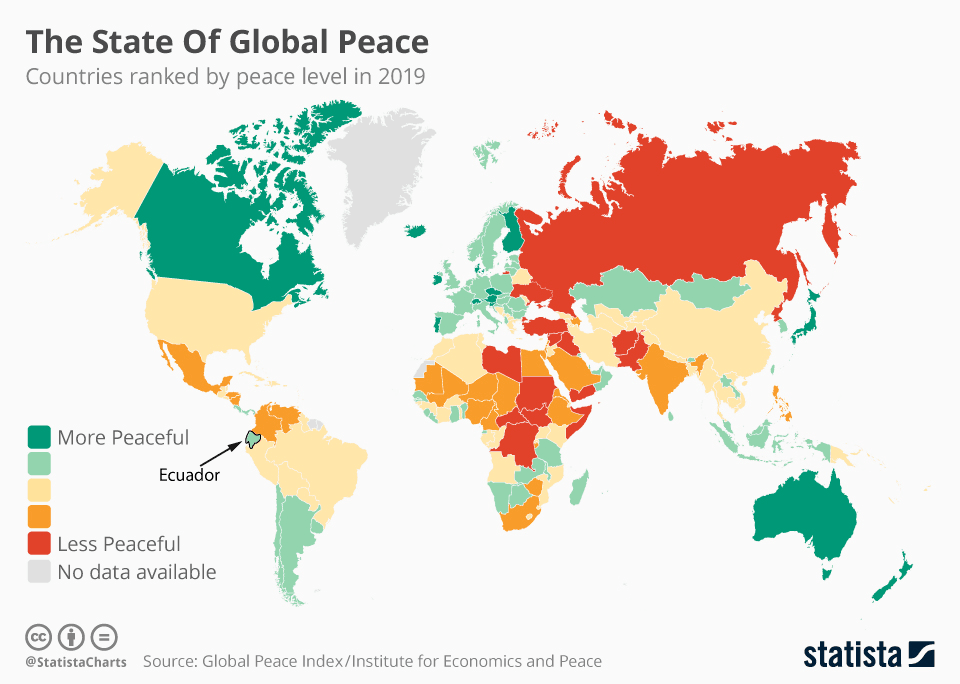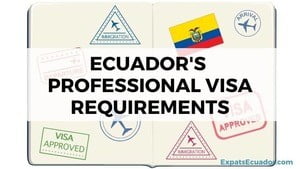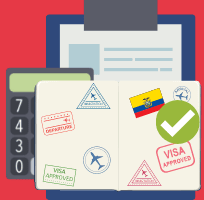We're getting to your messages. Thanks for your patience🙏
When you start planning your move to Ecuador, you'll most likely be constantly asked, "But, is Ecuador safe?"
I know I've been asked this question many times. And of course, it was a key consideration for me when I decided to make the move to Ecuador.
There are a few caveats, but yes, I consider Ecuador a safe country to visit and live.
By the end of this article you'll understand how I've reached this conclusion, and I'll also run through some common risks, how to avoid them and my learnings from some not-so-good experiences in Ecuador.
Ecuador is a small country in Latin America that neighbours Colombia and Peru. Whilst it's tempting to lump all of Latin America into one category to assess safety as a region, I'd argue this is not the way to approach it as each country, and city, has very different safety risks.
The below graph shows how peaceful a country is according to the Global Peace Index. This index takes 23 factors into consideration such as violent crime, terrorism, political instability, and access to weapons.

Ecuador's rank is 71, with only Uruguay and Panama ranked higher out of all South American countries. So, from one of the best objective measures we have, Ecuador is safer than almost every other country in the area (and the United States).
Just because Ecuador ranks relatively highly on the GPI, that doesn't mean it's a peaceful utopia. Like anywhere, there are risks. Luckily, most of them can be mitigated with common sense.
Ecuador's north eastern border (the amazon region) with Colombia is considered a no-go zone because of narco trafficking related deaths. Even journalists have been murdered in this lawless corner of Ecuador. If you're coming from Colombia, crossing the border between Ipiales and Tulcan, in the Andes region, is safe.
Violent crime is rare, but opportunistic crimes like pick pocketing are fairly common in tourist areas. Some well known areas to be paying extra attention:
Cuenca is touted as a safe place for expats - a reason why many retire here. But, secluded areas by the rivers can be tempting for thieves.
Thankfully, violent crimes in Ecuador are rare. But they do happen. This murder of a 79 year old lady from the US sent shock waves through my community in Cuenca when it happened. This was allegedly perpetrated by a worker of the deceased - so not a completely random act.
As a gringo, there will be the presumption that you have money. Which can make you a target - especially for opportunistic crimes. But, this is not likely to lead to anything more than petty theft or worse case a home robbery when the house is unattended.
For peace of mind I do recommend paying attention to the security features of your home/apartment. This includes paying for monitored home security and quality fences.
Ecuadorian's have been dealing with the persistent risks from earthquakes and volcanoes forever. Ecuador sits on a tectonic plate (part of the ring of fire of the Pacific), meaning there are also real volcano and earthquake risks to consider. One of Ecuador's main coastal expat destinations, Manta, was hit hard in the 2016 earthquake which killed over 600 people and leveled parts of Manta and other towns.
Volcanic eruptions in the sierras do occur. The large volcanoes around Quito are of particular concern. Cotopaxi, one of the highest volcanoes in the world (5,897m) hasn't had a great eruption since 1877, with some experts suggesting it's due for another.
Ash from erupting volcanoes can cause havoc. It's rained ash on our house several times in Cuenca - nothing severe, but it is a reminder to have a volcano action plan ready just in case.
Honestly, adjusting to the persistent earthquake and volcano risk was a little difficult for me at first. It's not something I've ever had to deal with. But, I rarely think of it now as I've accepted natural disasters can happen anywhere.
Perhaps your biggest risk as a new arrival is getting sunburn. The high altitude can result in very high UV, meaning you can get sunburnt in a matter of 15-20 minutes. Always have suncream and water with you.
We own a car and have driven around most of Ecuador. But, I still find this question difficult to answer as it's relatively complex.
Many of Ecuador's roads and highways got a major upgrade under a former president (Correa). However, with the seismic activity and constant landslides, maintenance of these roads is a constant issue. This forces you to be on guard to avoid potholes and other obstacles like surprise speed bumps.
I'd definitely suggest against driving at night, especially in poor lit areas. Fog is also an issue in the mountains.
My experience is that other drivers can be quite unpredictable everywhere in Ecuador. All drivers need to undergo basic training of around 32 hours as part of obtaining their driver's licence, but this doesn't appear to be sufficient.
Probably once or twice each month I'm perplexed at a decision made by a fellow driver. These are mostly harmless like driving slow in the fast lane, but there have been a couple of close calls that could have been avoided.
Trucks and buses are of the most concern. Keeping to aggressive time schedules turns some otherwise good drivers into risk takers and risk takers into downright lunatics. Bus accidents are too common as a result.
I'm still coming to grips with Ecuador's justice system and how this impacts drivers' rights. If there is an accident where someone is injured, all parties will go to jail until fault is determined. This can last days.
I'll admit that I'm paranoid about being the scapegoat because I'm not a local. It has happened to me before (in Dubai). My perceived risk is that I will be found to be at fault because I'll be judged by the police to have money and therefore more able to pay for the recovery - or heaven forbid, blood money to the family of the deceased.
For this reason, I purchased a dashboard camera with the purpose of being able to prove my innocence should I find myself in such a situation. My rationale was that it's a small amount to pay on the off-chance that such discrimination ever takes place.
If you're interested in obtaining a licence, read this post on the 3 different ways you can get an Ecuadorian licence.
Yes, but like anywhere, you need to take more precautions and be willing to accept that machismo culture is very much alive in Ecuador. Some Ecuadorian men are known to make females uncomfortable with unwanted attention. This can be in the form of catcalling, staring or being overly forward. In much rarer occasions it can involve touching.
Cases of femicide do occur in Ecuador (and in general in Latin america). One such case was two Argentinian girls who were killed in Montañita in 2016. Don't leave your guard down while traveling alone and be very suspicious when accepting any help from strangers.
Ecuador is a mostly traditional, catholic culture. So, victim blaming issues aside, you will stand out if you don't dress conservatively. I would not suggest wearing anything too revealing until you have a good grasp on the culture.
I've tried to keep the above somewhat objective. Now I'm going to provide some first-hand experiences and what I've learnt from them.
I arrived in Ecuador after spending 6 months in Medellin, Colombia. I really loved Medellin. I fell for it's energy, it's people and general attitude towards enjoying life. But, it is dangerous. I'd gotten used to constantly watching my back and belongings at all times. It was just part of life.
My first stop in Ecuador was Quito, and it immediately felt safer to me. Protecting myself from being a victim of crime was no longer something that consumed my thoughts.
That was a key reason I stayed in Ecuador. I felt safe here. Moving from Quito to Cuenca further increased my feeling of safety.
My key learning from this experience was that I didn't realize how much I valued the feeling of safety until I'd put myself in an environment that I felt safe.
You may not get the same feeling if you visit or live in Ecuador. Maybe you feel safer in Medellin, or New York, or Toronto, or Sydney, wherever. That is all okay. I only urge you to consider how much value you put on 'feeling safe' and include it in your criteria when deciding where to live.
As I mentioned above, I've been pick pocketed on the Ecovia bus in Quito. This bus line is notorious for bags being slashed, wallets and phones stolen. Even my Spanish teacher at PUCE warned me to keep my bag on my front to avoid being robbed.
It happened to me on my way to Spanish class. I was running late and hadn't had my morning coffee yet - I'm basically non-functioning with out it...
I'm normally super careful and keep my right hand in my right jeans pocket to hold onto both my phone and my wallet. This allows me to keep my left hand free to hold onto the rail. Maybe I wasn't alert because of my lack of coffee or maybe I was over-confident as I'd ridden the Ecovia many times without incident.
But for whatever reason, that day my right hand was not covering my belongings in my pocket. It was free as a bird and my phone could easily be seen in my jeans pocket. At my stop I tried to leave the bus, but there was a very obese male in his early 20's blocking my exit. I tried to get past him on the right, he'd move right. I'd shuffle across to the left and try to leave, he'd block my exit again. But, he did it in such a way that I saw it as more annoying than deliberate.
As I pushed past him, the doors closed and the music in my headphones stopped. I immediately knew my phone was pinched. My first reaction was to be angry at myself for letting my guard down. I was actually furious at myself for doing so. Then, I moved to being grateful that it was only a cheap phone and it could have been something more difficult to replace like my wallet with IDs and bank cards.
I knew the pain of losing a wallet in Ecuador as I'd done it about a year earlier. I was riding an inter provincial bus that dropped me in Puerto Lopez on Ecuador's coast. As I was exiting the bus, my wallet dropped out of my pants and onto the seat. I went to grab a coffee at the station and could not find my wallet to pay. I ran back to my seat no more than 1 minute later and my wallet was gone. Someone had picked it up and taken it. I asked everyone, including the driver. I'd paid the driver my fare less than 15 minutes before arriving, so it was clear a fellow passenger had it and they were not going to give it up.
This might sound weird, but this incident hurt me more than the theft of my phone by actual criminals. I guess I expected strangers on a bus to be more likely to help out a fellow traveler.
The lessons here are pretty clear. Don't let your guard down. Even if you've done the trip 100's of times. It's when you get complacent that you become an easy target.
I'm going to wrap this up with my observations from the State of Emergency that evolved over a 2 week period in October 2019.
It was a very weird experience. I hadn't seen society crumble like that. Supply lines were cut off, food was hoarded, schools and streets closed. There was a peculiar mixture of fear and fiesta circulating the streets.
I work online, so I tried to go about my business as much as I could. We'd stocked up on gas, groceries and water. We felt as safe as we could under the circumstances. It wasn't until the last days of the strike, when our street was blocked off and an angry mob was roaming close to our house that I thought we could be under genuine threat. Mob mentality can be very dangerous, and the mob had been drinking most of the day.
I found it hard to understand how Ecuadorians could cause so much damage to their own country. Damaging roads, buildings and other property. Most of the groups I'd seen going into town to strike didn't seem to be politically motivated - rather they looked like they were in it for the excitement. Like teenagers going to join a street party, booze and all.
I'm not doubting that there were many that had political intentions. But that was not what I saw. We deliberately tried to stay as far away as possible to keep our family safe.
As amazed as I was at how easily Ecuadorians could damage their own country, I was equally in awe at how quickly they were willing to repair it. The thousands of people volunteering to clean the streets immediately after the paro was called off was so heart warming. You could see the people coming together to start rebuilding their country. It was so good to see.
The paro was a genuine reminder that life in Ecuador can be unpredictable. You do need to be prepared for things you'd never thought possible. But isn't that part of life as an expat - to experience how other people live? Warts, beauty and everything in between.





Hello,
I like to to get an investor visa but I only have my American passport to open a bank account to make the initial 40k deposit. Which banks in Quito would accept just my passport to start 40,000 CD? Thank you.
Jason, your comment about pickpockets using liquid is spot on, so to speak. I had been in Quito just 12 hours and was walking down Olmedo to the Community Hostel for the free walking tour when I felt liquid hit my arm. I sped up and they sprayed me again but hit my pants. I had a pretty good idea what was happening so when two "tour touts" with plastic maps immediately showed up, each with a very conveniently fold napkin, I just backed up to the wall and waited for the crossing light to turn green. They were pretty insistent on helping so I took their napkins and wiped my arm off. It was funny at the time, but when I got to Community Hostel and saw how much they had sprayed on me I got a bit hot. They did not get anything but I had to pay $5 to get my clothes laundered.
Something similar (liquid) happened to me in Phnom Penh and in Nepal they used the scrum getting off a bus as a way to distract their intended victims. The good thing is none of the pickpockets were violent at all. They work by stealth, not violence. Or so it seemed. Talking about this stuff helps people avoid getting ripped off and is a good thing.